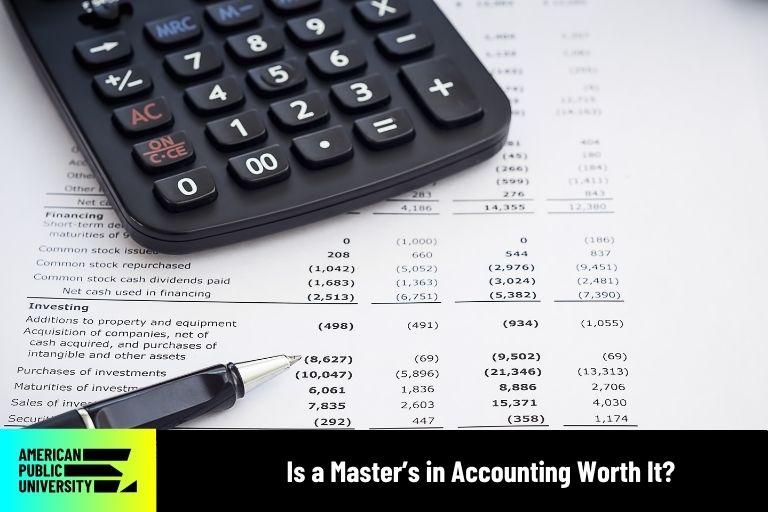07/15/2025

Recent regulatory shifts—like the move to enhance tax compliance and financial transparency—have transformed accounting roles. Far more than balancing books, modern accountants integrate financial reporting, risk assessment, and analytics into their daily responsibilities. With these expanded demands, aspiring and current undergraduate degree students often ask—is a masters in accounting worth it?
This advanced credential can equip you with the deeper analytical and technical skills needed to:
- Understand complex tax law and audit processes
- Use tools for business analytics and financial modeling
- Lead cross-functional teams and manage risk
- Prepare for CPA certification exam eligibility and other certifications
This overview examines how a master's degree in accounting builds upon undergraduate study, introduces specialized knowledge, and may support preparation for professional certifications.
How a Master’s in Accounting Builds on a Bachelor’s Degree
Bachelor’s degree programs provide foundational instruction in accounting principles, financial reporting, and business administration. Students typically complete coursework in financial accounting, managerial accounting, auditing, and tax accounting.
A master’s degree in accounting expands on these subjects by introducing advanced topics such as:
- Audit theory, internal controls, and regulatory compliance
- Financial reporting standards for publicly traded companies
- Business analytics and financial management techniques
- Risk management, corporate finance, and forensic accounting methods
Master’s degree programs may also include specialized coursework that allows students to explore specific areas of interest, such as forensic accounting, managerial accounting, or business analysis.
Employment Outlook with a Master’s in Accounting
According to data from the U.S. Bureau of Labor Statistics, employment for accountants and auditors is projected to grow 4% between 2022 and 2032. While many entry-level positions in accounting require a bachelor’s degree, some advanced or specialized positions may seek candidates who have completed additional education.
Roles in areas such as forensic accounting, financial analysis, and risk assessment may involve competencies introduced in graduate-level coursework.
Meeting CPA Requirements with a Master’s in Accounting
In most U.S. jurisdictions, CPA licensure requires completion of 150 semester credit hours of academic study. Individuals who earn a bachelor’s degree in accounting may meet the remaining credit hour requirements by taking additional undergraduate or graduate coursework.
Some master’s programs include courses that align with CPA exam content, such as:
- Financial Accounting and Reporting (FAR)
- Auditing and Attestation (AUD)
- Regulation (REG)
- Business concepts related to financial management and tax compliance
While a master’s degree is not required for CPA eligibility, some individuals pursue graduate study to complete required credit hours or strengthen preparation for CPA exam content.
Areas of Focus in Master’s in Accounting Programs
Master’s in accounting programs may offer coursework in specialized areas such as:
Forensic Accounting and Fraud Detection
- Investigative methods for reviewing financial transactions
- Analysis of financial irregularities and internal controls
Corporate Governance and Risk Management
- Internal audit processes and corporate governance frameworks
- Risk management practices aligned with regulatory standards such as SOX and PCAOB
Tax Strategy and Planning
- Advanced tax compliance and planning
- Cross-border tax considerations and regulatory compliance
Business Analytics and Financial Modeling
- Use of data analysis tools such as SQL, Excel, and Power BI
- Application of data for financial forecasting and decision-making
Program curricula may vary depending on specialization areas and institutional offerings.
Skills Gained from a Master’s in Accounting Program
In addition to technical instruction, master’s in accounting programs may introduce coursework that emphasizes communication, leadership, and business management concepts. These topics may support individuals who pursue supervisory responsibilities or roles that involve presenting financial information to organizational leadership.
Some programs include capstone projects that simulate real-world accounting, helping students apply both technical and organizational skills.
Online Options for Earning a Master’s in Accounting
Some institutions offer online master’s in accounting programs designed to accommodate working professionals. These programs often include:
- Coursework aligned with the CPA credit-hour requirements
- Faculty with experience in public or corporate accounting
- Specializations in areas such as forensic accounting or business analytics
- Access to financial aid services and academic support resources
Online learning formats may provide flexibility for individuals balancing work and academic study.
Evaluating the Costs and Benefits of a Master’s in Accounting
Pursuing a master’s degree requires a time and financial commitment, often taking one to two years of part-time or full-time effort. Before enrolling, consider:
- Whether you need specialized knowledge not available through certification alone
- The degree’s role in achieving your career objectives
- Options for financial aid, tuition reimbursement, or part-time enrollment
- If your goal is CPA eligibility, certification, or mastery of business analytics
Ideally, the decision aligns with your goals in leadership, finance, or advisory roles.
Alternative Certifications in Accounting and Finance
In addition to graduate study, individuals may pursue professional certifications that support specialized areas of accounting or finance, including:
- Certified Management Accountant (CMA): Focused on corporate financial planning and analysis
- Certified Internal Auditor (CIA): Focused on internal auditing and internal controls
- Chartered Financial Analyst (CFA): Focused on investment management and financial analysis
These certifications may serve as additional educational pathways that align with specific interests in the accounting and finance professions.
Weighing the Value of a Master’s in Accounting
Master’s degree programs in accounting introduce advanced coursework in financial reporting, tax compliance, risk management, and financial analysis. Graduate study may support individuals seeking to expand technical knowledge, prepare for certifications such as CPA, CMA, or CIA, or explore specialized academic areas in accounting.
Program curricula often include:
- In-depth coursework in accounting standards, tax planning, and financial reporting
- Educational content aligned with professional certification exams
- Opportunities for advanced study in business analytics, data-driven financial forecasting, and financial modeling
- Exposure to collaborative learning environments through group projects or cohort models
Before choosing between a master’s degree and certification, consider how each aligns with your academic and career goals.